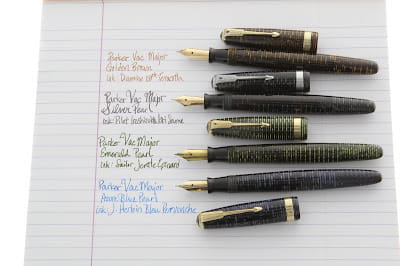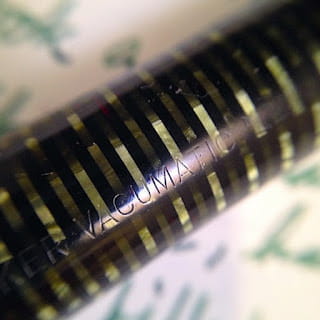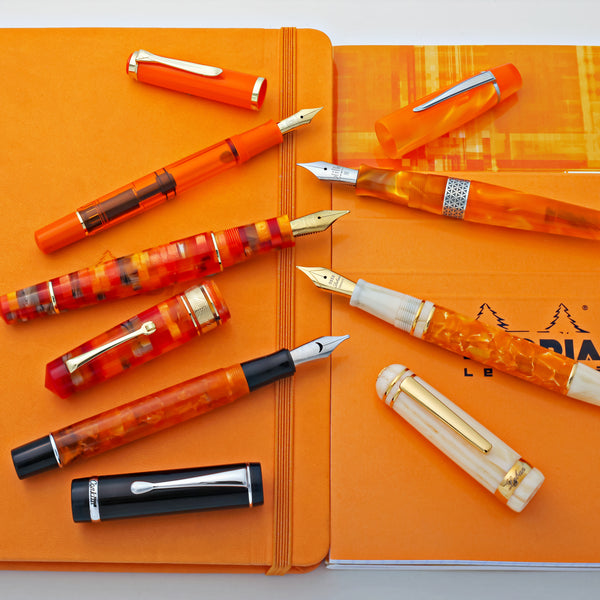What is My Pen Worth? Part 2 - Evaluating Condition
This is Part 2 in our series "What is My Pen Worth?," where we discuss the details of how to assess and successfully sell older writing instruments for their maximum value. If you missed part one, click here to see how to make an accurate ID of your pen.
Now that you've successfully identified your pen's make and model, your next task is to give an honest evaluation regarding the condition of the pen.
Why be concerned about the condition?
On the value spectrum, it matters greatly whether the pen in question is new with the original box and papers or if it is in pieces and requires restoration. Here is a simple chart to give you an idea of value based on condition.
Brand new, in box with original papers - $$$$$
Like new, recently restored, gently used - $$$$
Used, working, with some cosmetic issues - $$$
Not-working, dings, dents, but all pieces intact - $$
Broken, for parts - $
Hypothetically speaking, let's say that "Pen X" recently sold on eBay for $100. It was in mint condition, in the original box with paperwork. You have a "Pen X" that you would like to figure out the value of. It is the same make & model, but it is missing the box and still writes nicely. It would probably be worth about $80. If it has a few cosmetic scratches and dings, but still works, it would probably be worth about $65. If it isn't working and has dings & dents, but all the pieces are there, it might go for only $30. If the same pen was broken, missing parts or in otherwise poor condition, it may only fetch $10-$20, depending on what parts are intact.
That is a hypothetical scenario, but I hope you see the point. The perceived value of an auction can change greatly if you can accurately gauge the condition of the pen rather then list it blindly with a simple picture of a pen that you're unsure if it works or not. Even a mention of including the original box can increase the value of the pen by 15% over an auction that doesn't include the box.
Seriously, What is a Box Worth?
Having the original box and papers that accompany a writing instrument is a big deal, especially in the vintage market. These older boxes and paperwork give the collector a clear window into the world of yesteryear when that pen was originally sold. Even magazine advertisements for vintage pens can sell for $5-$10 a page.
It's always a good laugh to see how much the pen was originally sold for back in the 40's and 50's. Adjusted for inflation, they were still a significant expense!
If you have a box that came with the pen, you would want to make sure that the box actually belongs to the particular pen you are looking at. See if the brand names match. Look for any paperwork that may match with the make and model of the pen in question. Check other auction listings online to see if others are selling the pen with the original box. Does that box match yours? Note the condition of the box and be sure to photograph it with the pen inside if you are planning on listing it for sale.
 |
| 4 fully functioning Parker Vacumatics from the 1940's |
Does the Pen Write?
The working / not-working part is the most important aspect that is the easiest to test. However, not many laypeople know how to test a vintage fountain pen to see if it is functioning. That is where the additional detail research we talked about in part one of our series comes into play.
If you've done your homework and looked at what type of fountain pen filling system you have (lever, button, vacumatic, snorkel or otherwise), you should be able to find out how to test if your pen can be filled or not. If you need visual help, Google "how to fill a FILLING SYSTEM fountain pen," where you replace the words "filling system" with the type of filling system your pen has. Most likely, someone has done a YouTube video on the subject and will give you a visual step-by-step to fill the pen.
A simple test to see if the pen fills with water can determine whether your pen's filling system is working or in need of repair. Pens that are found after years and years of being neglected will most likely need a replacement sac or other part that usually disintegrates or degrades over time. If you're lucky, the pen may fill up and hold water just fine.
If the pen passes the water test, the next test would be to ink it. Find a safe ink made for fountain pens. Nothing fancy, just something safe to test with, like Waterman blue. Expel the water from the pen and fill with a small bit of ink. How does the nib write? Is ink coming out of the tip smoothly? Is there any hesitation, stopping, leaking or anything else that seems odd with the writing experience? Of course, it takes an experienced hand to understand the nuances of writing with fountain pens, but you should be able to get a gist for whether the pen will actually write or not.
Keep notes of how the fountain pen wrote so you could include it later for an auction listing.
In the case of a ballpoint pen, rollerball or mechanical pencil, you may have to replace the cartridge that was installed in the pen. Sometimes, the older cartridges may be difficult or impossible to obtain, but there is usually a modern version of the cartridge that would be reverse compatible.
The general rule is, if it can write correctly from the get-go, then it would be valued higher by the potential buyer or collector.
 |
| Waterman 14kt Ideal Nib with Flex - 1940s |
How Does the Pen Look?
While looks aren't everything, the cosmetic condition of the pen matters a great deal to collectors. Look at the pen, preferably with a loupe or magnifying glass, and note any major dings, dents, scratches or cracks in the surface of the material. Inscriptions other than the typical brand markings (like the previous owner's engraved initials) should also be notated. Unfortunately, any engraved modifications usually lowers the value of the pen.
 |
| "VACUMATIC" Imprinted on barrel |
If you are intending to list this item for sale or auction, it does help to photograph any dings, dents or engravings that may be on the pen. A macro lens can clearly capture the up-close, fine details. Note them as well to include in the listing description.
You can put a little elbow grease into improving the condition of the pen, which, in turn, increases its perceived value. Metal trims and certain resins can be polished up using some Simichrome polish to remove minor imperfections. I've used the polish with great success on metal trims and clips to resurrect the shine that was hidden by years of tarnish. However, unless you're a professional craftsperson, I would not recommend to take a full restoration into your hands. You could do more damage to the pen, which would further lessen the value.
 |
| Restoration (top photos before, bottom photos after) of Parker Vac |
Particular points to look for in assessing the cosmetic condition of a pen:
- Are there any parts missing? (Clip, cap, blind cap, lever box, converter, etc)
- Are the nib tines aligned and straight, or bent and misshapen? (this would usually effect the writing quality mentioned previously)
- Are the imprints on the nib and anywhere else on the pen crisp? Or are they faded / illegible?
- Is the clip strong or loose and wobbly?
- Does the cap thread on to the top of the pen easily?
- If there are any transparent areas of the pen, can they bee seen through clearly?
 |
| Parker 45 Classic - Notes for Auction |
Note Everything
Along with your notes from the first step in identifying the pen (including he brand, make, model and approximate year of manufacture), you should also note the nib type / writing mode, and have a full list of condition notes. All of these notes will help tremendously in writing a full description for your item listing if you were to choose to auction or sell it.
Now that you're armed with the information regarding the condition of the pen, you can take the final step and determine the current market value of your pen.
If you have some suggestions or particular points about pens that you look for when determining the condition of your pens, please feel free to drop us a note here in the comments.
--------------------
Disclaimer : Although I'd love to help every one of you that are trying to do your own detective work, there's not enough time in the day and we're not official appraisers of pens, nor do we purchase our inventory from private sellers.



